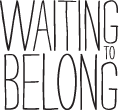Adoption and your extended family
How to help your relatives embrace your adopted child
By Focus on the Family Canada staff
Julianna nervously walks down the stairs from the arrivals level to the baggage claim with her newly-adopted daughter in her arms. Her husband Todd glances at her and voices what Julianna has been thinking, but is afraid to say out loud.
“How do you think he’ll respond?”
Julianna tucks her arm in her husband’s and leans close.
“Let’s just hope for the best. We love her so much. She’s so beautiful. Why should her race make any difference?”
Todd nodded. “I know. But it isn’t just that; He doesn’t understand how we could love a child we didn’t give birth to. And he’s so attached to Jacob, I’m afraid he will treat them differently.”
Julianna’s mom and dad are waiting on the other side of the doors with Todd and Julianna’s biological three-year-old son, Jacob. Julianna’s dad has made no secret of his disappointment that they decided to grow their family through adoption. He was even less impressed that they chose to adopt a child of another race.
The doors open; they step through. Jacob runs up to Mom and Dad and is smothered in a big hug. Baby Bethany is passed to Grandma who is overjoyed to hold her new granddaughter.
Grandpa John looks over at his wife with the precious bundle in her arms and, to his own enormous surprise, his heart leaps and he reaches for her with a catch in his throat.
“Why, she’s beautiful . . .” he stammers. “Can I hold her?”
From this very moment on, Grandpa becomes Bethany’s biggest fan and staunchest protector.
* * *
This is a “best-case scenario” for family members who may not be as excited as you are about your decision to adopt. Unfortunately, not every extended family member always comes around so quickly and easily, if at all.
Remember that, while you have given a lot of thought and prayer to your decision to adopt, your relatives have not. They may have preconceived ideas about adoption that may include stereotypes and prejudices that are not helpful; they may have legitimate concerns about your capacity to handle what you are about to do; they may just not handle change well.
How do you handle an unsupportive family member?
Pre-adoption tips
- Expect questions, objections, concerns; they will need to be educated about adoption;
- Give an opportunity for extended family to express their reservations while you just listen, non-defensively;
- Provide answers to their questions;
- Accept that their feelings are their feelings, not yours;
- Consider their perspective but don’t allow it to dictate your choice of whether to adopt or not;
- If your relatives are believers, ask them to pray with you that God will help you make the best decisions in this matter. (Prayer has power to change people’s hearts!)
- Having heard them out, ask them to respect and support whatever decision you make, to whatever degree they feel comfortable.
Post-adoption tips
- Prepare your relatives for what to expect when your child comes home. Can they hold? Babysit? Should they give you space to bond?;
- Help them understand your child’s background and any special needs your child may have;
- If they are believers, ask them to pray for your child’s transition into your family;
- Encourage them to establish their own unique role in your child’s life;
- Gently insist that they treat each of your children equally;
- If they show favouritism to a degree that is harmful to one or more children, point it out respectfully and ask them to change this behaviour;
- If an extended family member(s) cannot or will not change, you may find it necessary to limit contact with that relative(s) and focus on spending time with those who can be respectful and supportive to your whole family.
Always remember that you cannot control other people’s feelings and behaviours. We can ask for change; we can educate; we can hope and pray for a positive response and, if necessary, we can limit contact so that our children will not be harmed from insensitive or cruel interactions.
The good news is that most adoptive parents find that family members are supportive. The few who are not supportive usually come around once they get to know the child.
If you find that a few relatives do not support you or your child, do what you must to safeguard the well-being of your child and your family.
© 2011 Focus on the Family (Canada) Association. All rights reserved.
